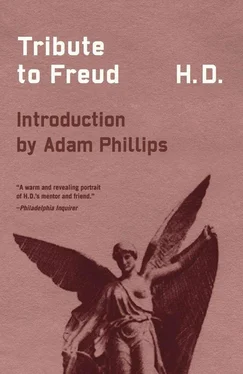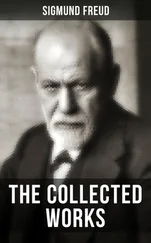Yet it was so supremely natural that I turned to Mr. Van Eck, at the table. “It was beautiful watching the dolphins,” I said. “If only Bryher had been with us.” Bryher said, I thought a little sullenly, “Where were you anyway?” I said, “I was on deck. I dashed up for a breath of air and to see the sunset. I was on deck watching the dolphins with Mr. Van Eck.” I turned to Mr. Van Eck for confirmation.
He smiled at Bryher across the table. He had an engaging manner. The captain said, “Dolphins? The wireless-operator is our dolphin expert. He reported no dolphins.” “But there were dolphins.” I turned to Mr. Van Eck again for confirmation. “Which way were they swimming?” said the captain. I indicated above the table the direction of the frieze of flying dolphins. “They were swimming this way,” I said, indicating a line “forward,” past Mr. Van Eck down the table. “That’s right,” said the captain, “that’s how they would be swimming. They swim with the wind. I must ask the wireless-operator.”
But now I said to the Professor, “Where was I, if Bryher couldn’t find me?”
Perhaps this is an old conundrum. Perhaps there is no answer to it or it may be dangerous to ask it, for the wrong answer (as with the Sphinx in Egypt) may bring death. At least, I could record the details of my experience, could note them down, could weave and re-weave the threads, the tapestry on this frame. It did not really matter where I was. Perhaps it was a story like the erlking. Perhaps, as is more likely, it was a story like Algernon Blackwood’s Centaur.
I had read The Centaur a number of times, first in America. There was that same theme, that same absolute and exact minute when everything changed on a small passenger boat (as I remember) on the way to Greece. At an exact moment, the boat slipped into enchantment. So here, at an exact moment, by clock time, on an exact map, on the way to the Pillars of Hercules, on a boat that was bound for the port of Athens, there was a “crossing the line.” I think in The Centaur, the narrator or hero knew the minute, the second that the line was crossed. I, the narrator of this story, did not know I had crossed the line.
When I did realize it, it was too late, I could not approach Mr. Van Eck. He was on his way to Delhi.
Delhi, Delphi?
They arrange things that way, I suppose. If I had realized the story at the time of our parting in Athens, perhaps there would have been no parting. In which case, I would have lost the story.
At that table in the long salon, names were batted about to and fro, up and down, like old-fashioned table-tennis balls. London, Gibraltar, Algeciras, Malta, Athens, Delhi, Alexandria, Cairo. . I said to Mr. Van Eck that last morning at breakfast, “I suppose I’ll run across you in one of the capitals of Europe.” I did not want to make any definite arrangement for meeting him in Athens. “I’ll meet you in the Propylae,” he said.
Bryher and I met him in the Propylae with Dr. Ellis. But he let us go on alone through the gates, to the Parthenon.
8 P.M.
I feel limp and frustrated. I was annoyed at the end of my session as Yofi would wander about and I felt that the Professor was more interested in Yofi than he was in my story. I was annoyed because I heard someone laughing outside the door. I seldom hear or register what is going on in the waiting room or the hall. The Professor said, “So the memories are faded?” Perhaps he felt that I was really trying too hard to make a dramatic sequence of this story that was all “an atmosphere. . ”
I snapped at him rather, “No — not faded.”
The Professor asked me if I had seen this man again. I said, “Twice in London.” Perhaps the tone of my voice conveyed to him what I felt. Mr. Van Eck in London was not the Man on the boat.
March 14, 2:40 P.M.
A familiar nightmare last night. I was in one hotel or pension, Bryher and my mother were in another. I return to my room to find an irate landlady has removed all my clothes and belongings to another room, without consulting me. I am annoyed but in my dream too frightened to be other than polite. There are several children playing about. The children are indifferent but apparently not inimical. The landlady glares at me, “But we have no room here; you must get right out.”
I manage somehow to get my clothes, I am overburdened with them and with a number of awkward packages but I manage finally to reach Bryher and my mother. We are in Florence along the Arno but the Arno is only a riverbed with a few footprints. My mother says, “You are only safe on this side of the river.”
I am still overburdened and lost. My mother died just six years ago, in March. We had stayed in a hotel in Florence, Lungarno, along the Arno. I had first visited Florence in 1912 with both my parents. At this time too, fourteen years ago, I was waiting for the arrival of my child. I had been taken with what the Professor called the epidemic, in a pension in Ealing waiting to go into Saint Faith’s Nursing Home. There had been death in the house. Afterwards, I learned how shocked Bryher had been when she came to see me. The landlady had said, “But who is to see to the funeral if she dies?”
The dream content is commonplace. But I wake with heartache — heartache, yes, in the conventional romantic sense, and heartache or actual physical pain that frightens me.
I recover over my breakfast tray, Vienna coffee and rolls, and I go out and get the Sigmund Freud engraving that I had ordered a few days ago in the shop on the Ringstrasse.
7 P.M.
I told the Professor of the shock after my nightmare, as of a blow on my heart. He asked first of Van Eck — was it an Austrian name? He said, “I have an idea.” He rushed off and brought back a leather case, and showed me the name, stamped inside the folder. It was Vaneck.
He was interested to hear that Mr. Van Eck was the adopted son of the Victorian painter. He asked of the nationality. I explained that I thought it was a nom-de-guerre; they were a Dutch family, settled in London. I said painting reminded me of my mother. I told him how as children we had admired her painting and boasted to visitors, “My mother painted that.” My mother was morbidly self-effacing.
I went on to say how difficult it had been to reassemble the story of Peter Van Eck, when after all it was a conventional meeting or voyage-out romance. The Professor asked me to interpret my dream of the two rooms in the hotel or pension. I told him I thought it was fear of being moved, at the time of my pregnancy; perhaps it was fear of death. He asked me for more “historical detail.” I told him of various incidents during the war years when I had stayed in small rooms to be near my husband at his various training units. How difficult it was to get in anywhere at that time and of how once, coming from Buckinghamshire to see the doctor and being caught late in the fog, I had to find a room for the night. Wandering around Bloomsbury, a perfect stranger spoke to me. “I have a room you can have,” he said. It seemed impossible, but he opened one of those green doors in a row of green doors and introduced me to the landlady. “This lady is taking my room for the night,” he said. This did happen. Telling it, it seems part of a dream.
The Professor said, “But I know who the bad landlady is.” I asked innocently, “Who?” He said, “Myself.” I repudiated this and then remembered how upset I had been with Mary Chadwick of Tavistock Square, Bloomsbury, when she said at the end of our three months’ session, “You do like to talk, don’t you?” I told this to the Professor; he said, “But Miss Chadwick and your work with her is only a forerunner of myself.” I said, “No. She was a competent nurse, but not a doctor.”
Читать дальше











